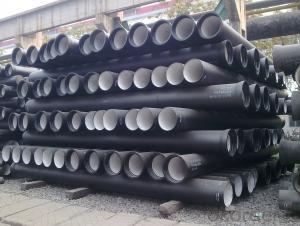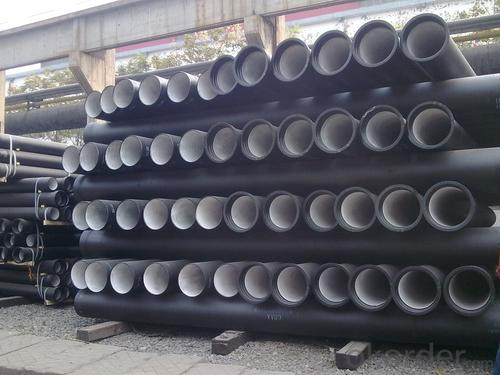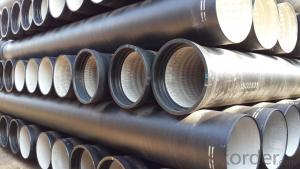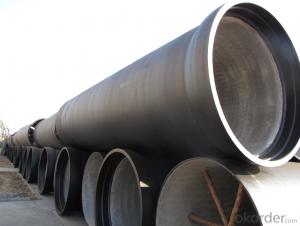Ductile Iron Pipe DN400
OKorder Service Pledge
Quality Product, Order Online Tracking, Timely Delivery
OKorder Financial Service
Credit Rating, Credit Services, Credit Purchasing
You Might Also Like
Specifications
Quick Details
| Place of Origin: | China (Mainland) | Brand Name: | CMAX | Model Number: | T type / K type / Flange type |
| Length: | 6m / 5.7m / Negotiable | Standard: | ISO2531 / EN545 / EN598 | Application: | Potable / Sewage water |
| Diameter: | DN80~DN2200 | Shape: | Round | Hardness: | 230 |
| Pipe Wall Thickness: | standard | Pull Strength: | 420 | Yield (≥ MPa): | 300 |
| Material: | Ductile Iron | Type: | Centrifugal ductile cast iron pipe | Certification: | ISO2531 / EN545 / EN598 |
| Outer Diameter: | 80-2200 | Thickness: | standard | Specification: | DN80~DN2200 |
| |
The advantages to the customer:
Trustworthy financial strength
One-stop shopping.
Fast and efficient service
Coordination of shipments from multiple plants.
Specialists of the overseas shipping process.
A more competitive price.
- Q: Can ductile iron pipe be used for both water and sewage applications?
- Ductile iron pipe is versatile and can be used for both water and sewage applications. It is known for its strength, durability, and corrosion resistance, making it suitable for various purposes. With its high tensile strength, it can withstand the pressure and heavy loads associated with water and sewage systems. Its smooth interior surface minimizes friction and enhances flow efficiency, making it perfect for transporting water and sewage. It also has excellent resistance to corrosion and chemical attack, ensuring a long lifespan even in harsh environments. Moreover, ductile iron pipe comes in various sizes and configurations, allowing for customization to meet specific water and sewage requirements. In conclusion, ductile iron pipe is a reliable and adaptable option for water and sewage conveyance.
- Q: How is ductile iron pipe different from cast iron pipe?
- Ductile iron pipe and cast iron pipe are commonly used in plumbing and drainage applications, but they have differences in composition, strength, and flexibility. To begin with, ductile iron pipe is made from a different iron alloy than cast iron pipe. Ductile iron contains more carbon and silicon, which gives it increased strength and durability. On the other hand, cast iron pipe is made from gray iron, which has higher carbon content but lacks the flexibility of ductile iron. Moreover, ductile iron pipe is renowned for its superior strength and resistance to impact. It can withstand higher pressures and is less likely to crack or break under heavy loads or external forces. Cast iron pipe, although strong, is more brittle and prone to fractures and failures. Another significant distinction is the flexibility of ductile iron pipe. It possesses greater flexibility and can endure bending and deformation without fracturing. This flexibility facilitates easier installation, particularly in areas with uneven terrain or where ground movement may occur. In contrast, cast iron pipe is less flexible and more rigid, making it unsuitable for applications that require flexibility. Additionally, ductile iron pipe has a smoother interior surface compared to cast iron pipe. This smoothness reduces friction, enhances flow efficiency, and minimizes the accumulation of sediment and deposits within the pipe, resulting in improved water flow and reduced maintenance needs. In conclusion, ductile iron pipe sets itself apart from cast iron pipe due to its composition, strength, flexibility, and smooth interior surface. Ductile iron offers superior strength, impact resistance, and flexibility, making it the preferred choice in various plumbing and drainage applications.
- Q: Are ductile iron pipes suitable for use in cold climates?
- Ductile iron pipes are well-suited for cold climates due to their exceptional strength and durability. This makes them a reliable choice for various applications, such as water supply systems, sewage systems, and industrial piping. In freezing temperatures, ductile iron pipes are highly resistant to cracking or breaking. This is because of their unique metallurgical composition and structure. They possess a high tensile strength and can endure the expansion and contraction resulting from freezing and thawing cycles. Additionally, their smooth internal surface prevents ice or sediment buildup, ensuring efficient flow and reducing the risk of blockages. Overall, ductile iron pipes are a dependable and appropriate option for use in cold climates.
- Q: Can ductile iron pipe be used for sewer and wastewater systems?
- Yes, ductile iron pipe can be used for sewer and wastewater systems. Ductile iron is a type of cast iron that has improved properties such as increased durability, strength, and flexibility. These qualities make it suitable for underground applications, including sewer and wastewater systems. Ductile iron pipes are resistant to corrosion and can withstand high-pressure conditions, making them ideal for conveying sewage and wastewater. Additionally, ductile iron pipes have a long service life and require minimal maintenance, which makes them a cost-effective choice for sewer and wastewater infrastructure.
- Q: Can ductile iron pipes be used in high-temperature applications?
- Ductile iron pipes are capable of being utilized in applications that involve high temperatures. Unlike PVC or HDPE pipes, ductile iron pipes possess a higher melting point, rendering them suitable for transporting fluids at elevated temperatures. The material properties of ductile iron, encompassing its strength, toughness, and ability to withstand thermal stress, allow it to endure higher temperatures without distorting or failing. Nevertheless, it is worth noting that the precise temperature threshold for ductile iron pipes may vary depending on factors such as the grade of ductile iron employed, the pressure of the fluid being conveyed, and the duration of exposure to elevated temperatures. Consequently, it is imperative to consult the manufacturer's specifications and guidelines in order to ensure the appropriate selection and installation of ductile iron pipes for high-temperature applications.
- Q: Are ductile iron pipes suitable for fire protection systems?
- Ductile iron pipes are a perfect choice for fire protection systems. Ductile iron, being a robust and durable material, can endure extreme pressure and temperature fluctuations, making it an ideal option for reliable and long-lasting pipes in fire protection systems. Moreover, ductile iron demonstrates exceptional resistance to corrosion, preventing any deterioration of the pipes and ensuring the integrity of the fire protection system over time. Additionally, the high tensile strength of ductile iron provides added safety advantages, as it can withstand the stress and strain that may arise during a fire incident. Consequently, ductile iron pipes are extensively utilized in fire protection systems across various applications, including commercial buildings, industrial facilities, and residential areas.
- Q: What is the excavation width of ductile iron pipes with diameters greater than 1400?
- Then, according to the soil characteristics, different slopes are calculated, and the width of the excavation is calculated according to the depth and slopeIf the soil is soft, high water content and easy to collapse, the excavation width will be wide, otherwise the slope will be steep and the excavation width will be narrow
- Q: What is the average diameter range of ductile iron pipes?
- The average diameter range of ductile iron pipes is typically between 3 inches to 64 inches.
- Q: Can ductile iron pipe be used for underground applications?
- Yes, ductile iron pipe can be used for underground applications.
- Q: Can ductile iron pipes be used for stormwater drainage systems?
- Indeed, stormwater drainage systems can utilize ductile iron pipes. These pipes are renowned for their strength, durability, and resistance to corrosion, rendering them appropriate for various applications, including stormwater drainage. They possess the capacity to accommodate substantial water flow and endure heavy traffic loads, making them a reliable selection for stormwater management. Moreover, ductile iron pipes exhibit exceptional joint performance, guaranteeing a watertight and secure connection, a critical aspect in preventing leaks and preserving the integrity of the stormwater drainage system. All in all, due to their sturdiness, longevity, and ability to withstand the challenging conditions typically associated with stormwater management, ductile iron pipes present a viable choice for stormwater drainage systems.
Send your message to us
Ductile Iron Pipe DN400
OKorder Service Pledge
Quality Product, Order Online Tracking, Timely Delivery
OKorder Financial Service
Credit Rating, Credit Services, Credit Purchasing
Similar products
Hot products
Hot Searches
Related keywords

























